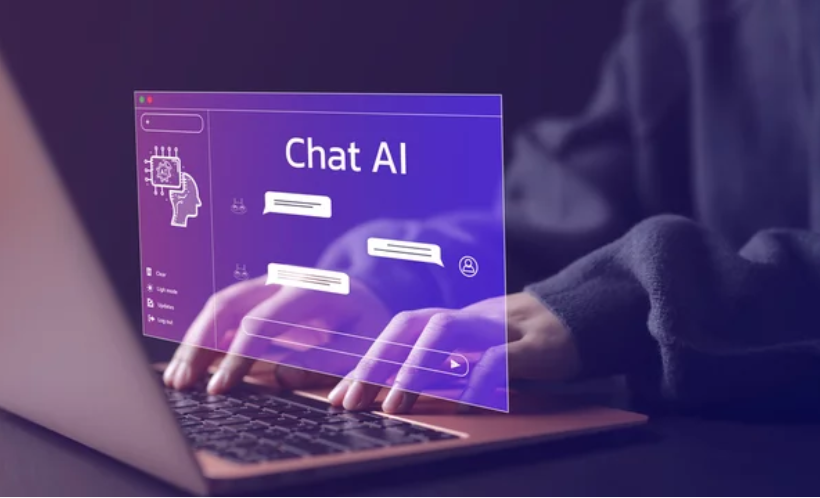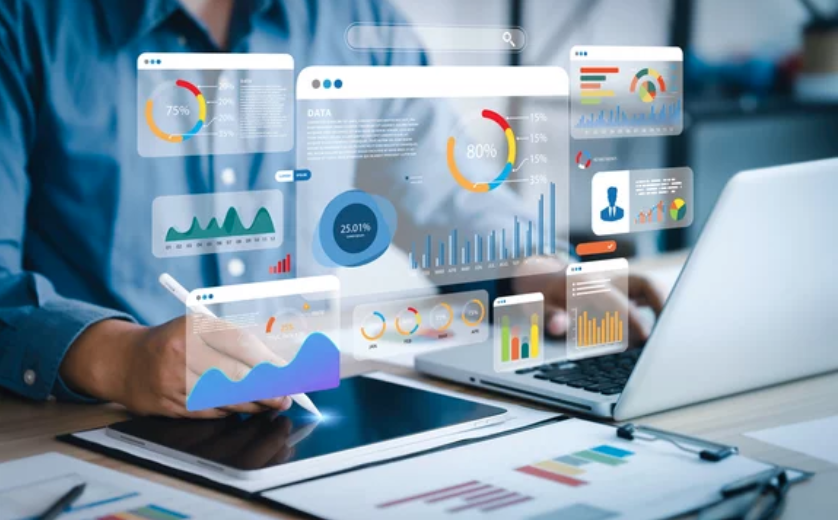Artificial Intelligence (AI) has changed digital marketing offering innovative solutions to enhance efficiency, personalize customer experiences, and drive better results. Building on insights from our previous blog, The Role of Using AI in Digital Marketing, we explore these 7 artificial intelligence solutions for digital marketing in 2024:
- Content Creation and Curation
- Marketing Automation
- Personalization Engines
- Chatbots & Virtual Assistants
- Voice Search Optimization
- Programmatic Advertising
- Performance Analytics and Reporting
1. Content Creation and Curation
Consistently creating high-quality content is an important opportunity for many marketers. The chance to produce informative, and SEO-optimized content regularly can be rewarding. AI tools like Chat GPT and Grammarly have made significant impacts in automating content creation, ensuring that it is engaging and optimized for search engines (SEO).
ChatGPT, which generates high-quality content, provides marketers with a versatile tool for various content needs. Whether crafting posts, creating social media updates, or developing email campaigns, it can produce any work. ChatGPT can generate content ensuring the content is relevant and creatively tailored to the target audience. This capability allows marketers to quickly produce large volumes of content without sacrificing quality, ultimately enhancing their digital marketing efforts.
Another significant AI tool is Grammarly, it stands out by doing more than just checking spelling. It provides advanced grammar suggestions, detects spelling errors, and recommends better word choices to enhance the overall readability of the content. It also checks for tone, helping writers adjust their style to match the intended audience, whether it’s formal, casual, or friendly. This ensures that the content resonates with readers and maintains a professional standard.
2. Marketing Automation
Artificial intelligence business solutions platforms, like HubSpot, play a big role in modern digital strategies. This platform streamlines tasks such as email campaigns, lead nurturing, and customer segmentation, leveraging AI to analyze customer behavior and engagement patterns.
For example, HubSpot exemplifies the power of AI in marketing automation by determining the most effective times to send emails to individual contacts, ultimately driving higher engagement and conversions.
Marketo is another strong AI-powered marketing automation platform that boosts digital strategies. Marketo uses AI to evaluate leads based on their actions and interactions, helping marketers find and focus on the best potential customers. This helps target the most promising leads, making their work more efficient and effective. Marketo also offers personalized content recommendations to customers, ensuring they get relevant information.

3. Personalization Engines
Platforms like Amazon Personalize use artificial intelligence to analyze large datasets for digital marketing. This AI-driven analysis uncovers individual customer preferences and behaviors, allowing for content and product recommendations.
Amazon Personalize enhances the shopping experience by utilizing browsing and purchase history to suggest products aligned with a user’s preferences. This tailored approach enriches the shopping journey.
Netflix is another platform powered by an AI personalization engine. Netflix leverages AI to analyze viewing habits, search history, and user ratings to recommend movies and TV shows that match individual tastes. By continuously learning from user interactions, Netflix can suggest content that users are more likely to enjoy, keeping them engaged and subscribed.
4. Chatbots/Virtual Assistants
AI-powered chatbots and virtual assistants automate customer service tasks seamlessly. They manage multiple conversations simultaneously, providing a personalized service. Whether responding to inquiries or facilitating transactions, chatbots streamline interactions, ensuring efficiency and customer satisfaction.
Mailchimp’s LiveChat, for example improves communication for individuals and businesses, enabling them to interact effectively via chat. It allows you to engage with website visitors, providing support and facilitating sales. This integration also helps capture new subscribers and send personalized marketing messages following each chat interaction.
Additionally, Starbucks’ virtual assistant enables customers to place orders swiftly using voice commands or text, simplifying the purchasing process and enhancing convenience. This interactive feature meets customer expectations for responsive service and cultivates loyalty through consistent, personalized interactions.
5. Voice Search Optimization
With the increasing adoption of voice-activated devices like Siri, Alexa, and Google Assistant, optimizing content for voice search has become essential for digital marketing. Many consumers prefer using voice commands to find information online.
Siri, Apple’s virtual assistant, exemplifies the importance of voice search optimization. Marketers optimizing for voice search must focus on incorporating long-tail keywords and phrases that align with how people speak naturally. By doing so, businesses can improve their chances of appearing in Siri’s search results and capturing local search intent effectively.
With Alexa, Amazon’s virtual assistant, users rely on the device to perform tasks and answer queries through voice commands. Marketers targeting Alexa users need to optimize content with conversational keywords that match typical voice search queries. This approach enhances visibility in Alexa’s search results.
By integrating these artificial intelligence business solutions to ensure content is accessible and relevant, marketers can enhance their visibility in voice search results. This not only expands their audience reach but also enhances user engagement, aligning with the strategic goals of artificial intelligence solutions for digital marketing.
6. Programmatic Advertising
Programmatic advertising uses AI to automate the ad-buying process, making sure ads reach the right audience at the right time. Platforms like Google Ads and Facebook Ads use artificial intelligence solutions for digital marketing to understand how people interact with ads and tailor campaigns to increase engagement and conversion rates. The AI takes into account various factors like demographics, browsing habits, and even the content of the page where the ad will appear, to place ads that are most likely to be effective.
Google Ads uses machine learning algorithms to optimize different parts of ad campaigns, such as bid amounts, targeting criteria, and ad creatives. These algorithms learn from past campaigns to predict which strategies will work best.
Facebook Ads utilizes AI to streamline the advertising process and maximize effectiveness. For instance, when creating an ad campaign on Facebook, marketers can specify target demographics, interests, and behaviors. Facebook’s AI algorithms then analyze amounts of user data to identify patterns and predict which audiences are most likely to respond positively to the ad.

7. Performance Analytics and Reporting
Google Analytics and Adobe Analytics leverage artificial intelligence solutions for digital marketing to provide performance insights. They analyze large volumes of data in real-time, predicting outcomes that traditional methods might overlook. This understanding helps marketers optimize their efforts by focusing on campaigns and strategies that resonate most with their audience.
Google utilizes predictive analytics to forecast which user groups are likely to convert based on their past behaviors and interactions. This predictive capability empowers marketers to adjust their strategies and messaging to effectively target these high-converting segments, maximizing campaign effectiveness and return on investment.
Adobe Analytics uses AI-driven predictive analytics to anticipate user behavior and preferences based on historical data. By analyzing patterns in user interactions across digital channels such as websites, apps, and social media Adobe Analytics identifies trends and forecasts potential outcomes.
Embracing AI Solutions
In 2024, AI will continue to be a game-changer in digital marketing, providing many solutions that enhance efficiency, personalization, and effectiveness. From content creation to performance analytics, AI tools empower marketers to deliver better results and create more meaningful connections with their audience. You should embrace these artificial intelligence solutions for digital marketing to stay ahead in the competitive digital space.

